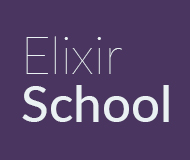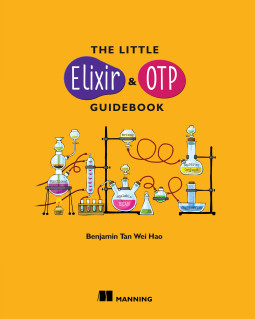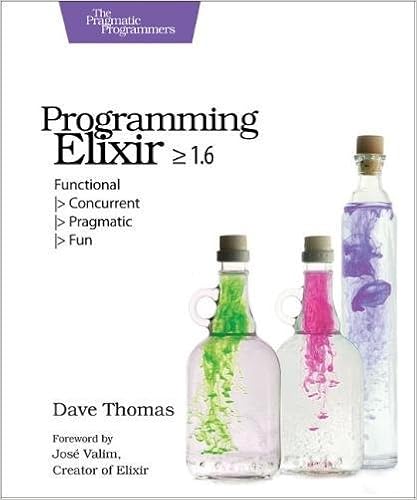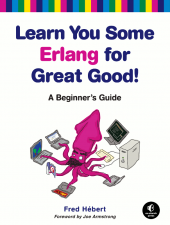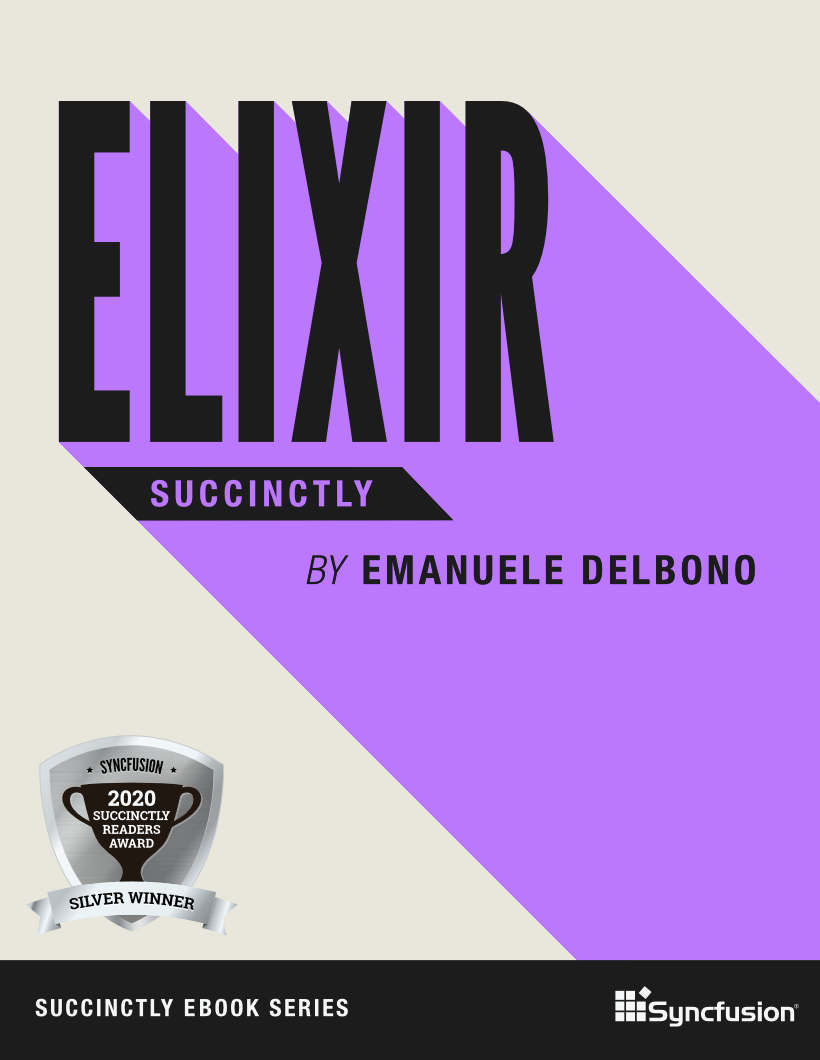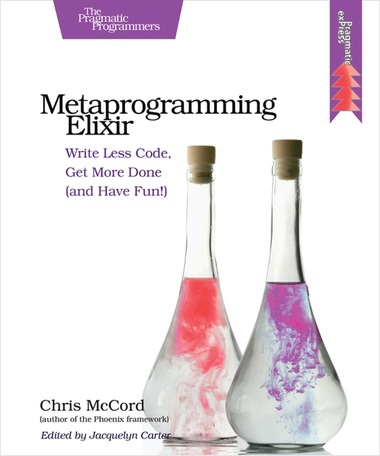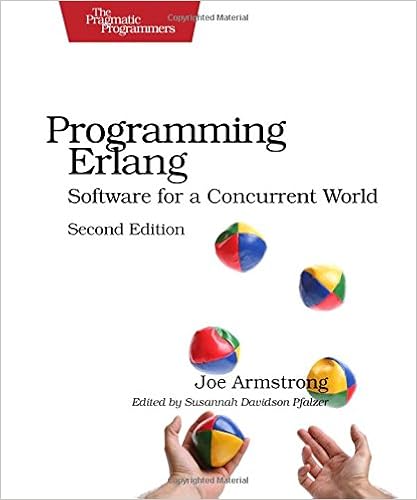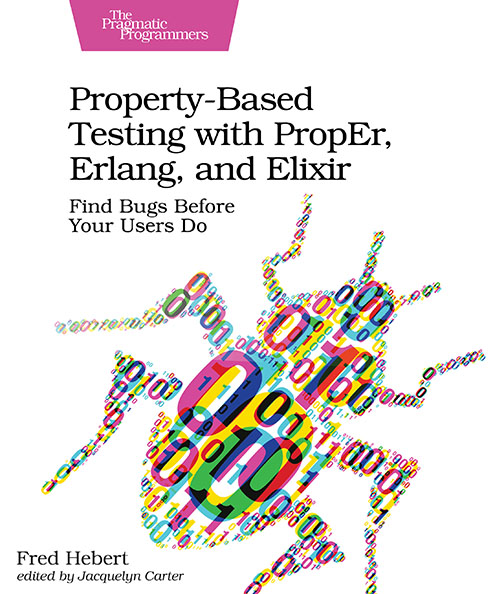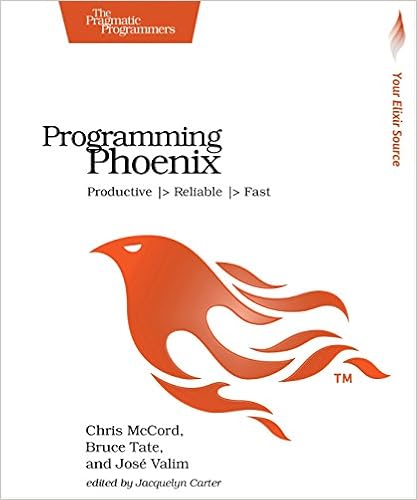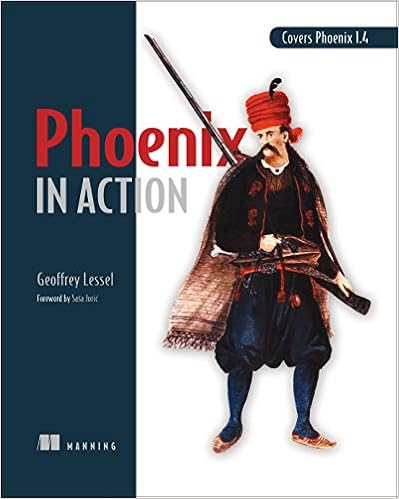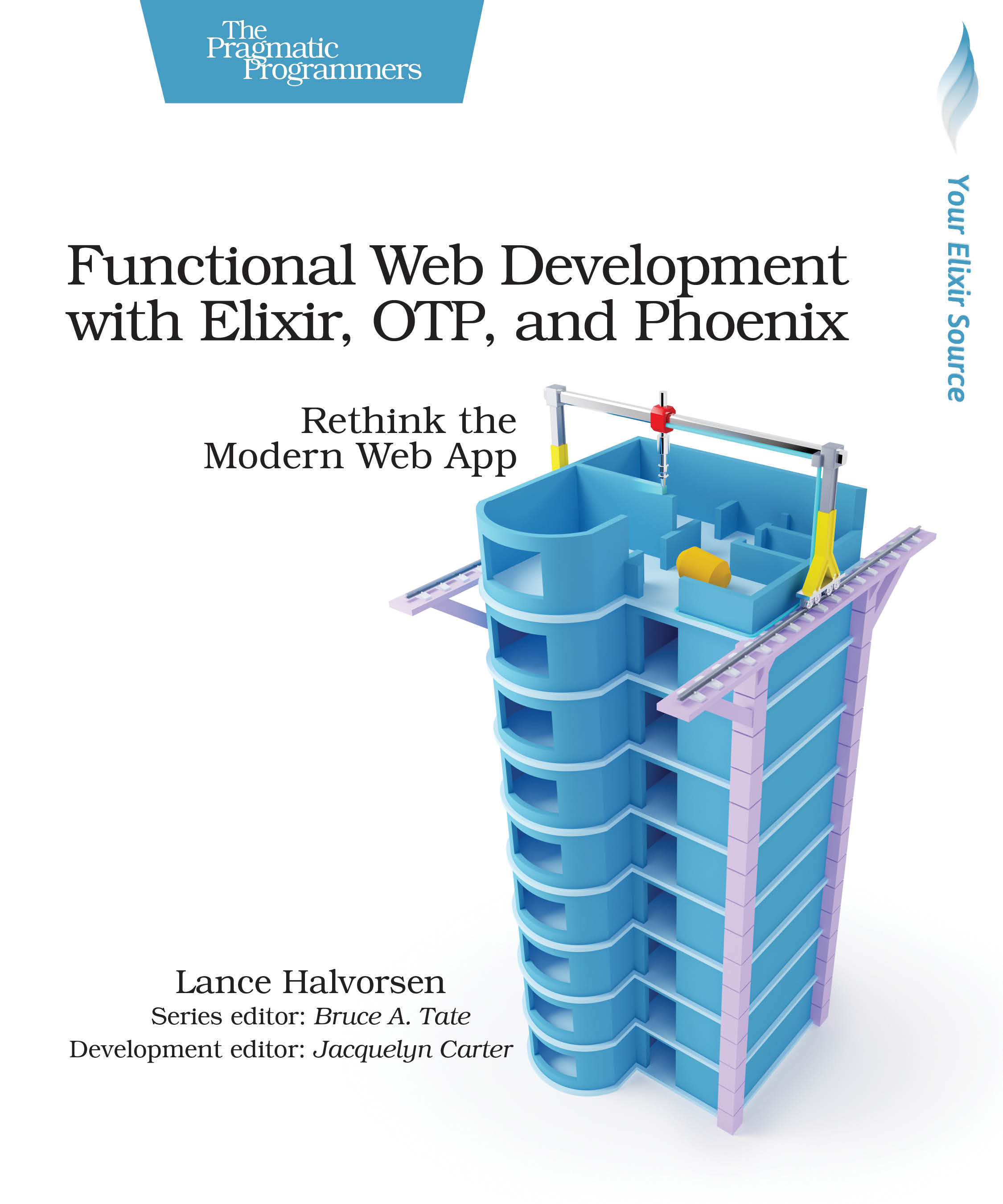Getting Started Free
Official Elixir starting guide that will take you through the language foundations. You will also explore how to build projects with Mix and OTP, and it will introduce you to more advanvced techniques suchs as meta-programming.
Adoption is more than programming. Elixir is an exciting new language, but to successfully get your application from start to finish, you’re going to need to know more than just the language. You need the case studies and strategies in this book. Learn the best practices for the whole life of your application, from design and team-building, to managing stakeholders, to deployment and monitoring. Go beyond the syntax and the tools to learn the techniques you need to develop your Elixir application from concept to production.
Elixir School Free
Elixir-School is an open and community driven effort inspired by Twitter’s Scala School. The site’s content consists of peer-reviewed lessons on various Elixir topics that range in difficulty. The lessons are currently available in over 10 languages to help make programming Elixir more accessible to non-English speakers.
Elixir is an excellent language if you want to learn about functional programming, and with this hands-on introduction, you’ll discover just how powerful and fun Elixir can be. This language combines the robust functional programming of Erlang with a syntax similar to Ruby, and includes powerful features for metaprogramming.
Études for Elixir Free
In this book, you will find descriptions of programs that you can write in Elixir. The programs will usually be short, and each one has been designed to provide practice material for a particular Elixir programming concept. These programs have not been designed to be of considerable difficulty, though they may ask you to stretch a bit beyond the immediate material and examples that you find in the book Introducing Elixir.
This book is a set of recipes grouped by topic that acts as a good reference to get ideas from or to quickly search for a solution to a problem. You will begin by launching an IEx session and using it to test some ideas. Next, you will perform various operations like loading and compiling modules, inspecting your system, generating a supervised app, and so on. Furthermore, you will be introduced to immutability, working with data structures, performing pattern matching, and using stream modules to generate infinite data sequences. You will learn about everything from joining strings to determining the word frequency in text. With respect to modules and functions, you will also discover how to load code from other modules and use guards and pattern matching in functions.
Elixir in Action teaches you how to solve practical problems of scalability, concurrency, fault tolerance, and high availability using Elixir. You'll start with the language, learning basic constructs and building blocks. Then, you'll learn to think about problems using Elixir's functional programming mindset. With that solid foundation, you'll confidently explore Elixir's seamless integration with BEAM and Erlang's powerful OTP framework of battle-tested abstractions you can use immediately. Finally, the book provides guidance on how to distribute a system over multiple machines and control it in production.
The Little Elixir & OTP Guidebook gets you started programming applications with Elixir and OTP. You begin with a quick overview of the Elixir language syntax, along with just enough functional programming to use it effectively. Then, you'll dive straight into OTP and learn how it helps you build scalable, fault-tolerant and distributed applications through several fun examples. Come rediscover the joy of programming with Elixir and remember how it feels like to be a beginner again.
Elixir, based on Erlang’s virtual machine and ecosystem, makes it easier to achieve scalability, concurrency, fault tolerance, and high availability goals that are pursued by developers using any programming language or programming paradigm. Elixir is a modern programming language that utilizes the benefits offered by Erlang VM without really incorporating the complex syntaxes of Erlang.
This book is the introduction to Elixir for experienced programmers, completely updated for Elixir 1.6 and beyond. Explore functional programming without the academic overtones (tell me about monads just one more time). Create concurrent applications, but get them right without all the locking and consistency headaches. Meet Elixir, a modern, functional, concurrent language built on the rock-solid Erlang VM. Elixir’s pragmatic syntax and built-in support for metaprogramming will make you productive and keep you interested for the long haul. Maybe the time is right for the Next Big Thing. Maybe it’s Elixir.
Hey there! This is Learn You Some Erlang for great good! This book is for you if you’ve got some programming experience and if you’re not too familiar with functional programming. It can still be useful if you’re too good for that, as we progressively go into more and more advanced topics.
Elixir’s straightforward syntax and this guided tour give you a clean, simple path to learn modern functional programming techniques. No previous functional programming experience required! This book walks you through the right concepts at the right pace, as you explore immutable values and explicit data transformation, functions, modules, recursive functions, pattern matching, high-order functions, polymorphism, and failure handling, all while avoiding side effects.
This isn’t your typical “let’s build a blog” situation. You’ll be working with me, the Dev Lead of the fictional Aerospace startup RED:4, as we dive into Elixir and conduct various scientific studies.
Elixir succinctly Free
This is a introductionary book about Elixir and OTP, written to go straight to the point. Almost 100 pages to learn the language and the platform.
Want to learn an up and coming functional programming language? Check out Elixir, designed by Ruby on Rails core team member Jose Valim. If you have a full-time day job, a family, or other pressing commitments, taking hours out of your week to read blog posts or spending the time to contribute to open source could be a deal breaker for you. This book helps to get you up to speed with what you need to know.
You know how to code in Elixir; now learn to think in it. Learn to design libraries with intelligent layers that shape the right data structures, flow from one function into the next,and present the right APIs. Embrace the same OTP that’s kept our telephone systems reliable and fast for over 30 years. Move beyond understanding the OTP functions to knowing what’s happening under the hood, and why that matters. Using that knowledge, instinctively know how to design systems that deliver fast and resilient services to your users, all with an Elixir focus.
Your domain is rich and interconnected, and your API should be too. Upgrade your web API to GraphQL, leveraging its flexible queries to empower your users, and its declarative structure to simplify your code. Absinthe is the GraphQL toolkit for Elixir, a functional programming language designed to enable massive concurrency atop robust application architectures. Written by the creators of Absinthe, this book will help you take full advantage of these two groundbreaking technologies. Build your own flexible, high-performance APIs using step-by-step guidance and expert advice you won’t find anywhere else.
Write code that writes code with Elixir macros. Macros make metaprogramming possible and define the language itself. In this book, you’ll learn how to use macros to extend the language with fast, maintainable code and share functionality in ways you never thought possible. You’ll discover how to extend Elixir with your own first-class features, optimize performance, and create domain-specific languages.
If you need to build a scalable, fault tolerant system with requirements for high availability, discover why the Erlang/OTP platform stands out for the breadth, depth, and consistency of its features. This hands-on guide demonstrates how to use the Erlang programming language and its OTP framework of reusable libraries, tools, and design principles to develop complex commercial-grade systems that simply cannot fail.
Erlang and OTP in Action teaches you the concepts of concurrent programming and the use of Erlang's message-passing model. It walks you through progressively more interesting examples, building systems in Erlang and integrating them with C/C++, Java, and .NET applications, including SOA and web architectures.
A multi-user game, web site, cloud application, or networked database can have thousands of users all interacting at the same time. You need a powerful, industrial-strength tool to handle the really hard problems inherent in parallel, concurrent environments. You need Erlang. In this second edition of the bestselling Programming Erlang, you’ll learn how to write parallel programs that scale effortlessly on multicore systems.
This book intends to be a little guide about how to be the Erlang medic in a time of war. It is first and foremost a collection of tips and tricks to help understand where failures come from, and a dictionary of different code snippets and practices that helped developers debug production systems that were built in Erlang.
Erlang is emerging as a leading language for concurrent programming in mission-critical enterprise environments where applications must deliver exceptional reliability, availability, and scalability. It’s already used by organizations ranging from Facebook to Amazon, and many others are adopting or considering it. As a functional language, however, Erlang is radically different from conventional object-oriented languages like C++ and Java. This book quickly brings experienced object-oriented programmers up to speed with both Erlang and the principles of functional programming. Jerry Jackson thoroughly explains Erlang’s key concepts, principles, and features, bridging the conceptual gaps that often frustrate object developers. Next, he shows how to use Erlang to build massively-scalable real-world systems with up to “nine nines” availability: that is, up to 99.9999999% uptime.
Learn and understand Erlang and Elixir and develop a working knowledge of the concepts of functional programming that underpin them. This book takes the author’s experience of taking on a project that required functional programming and real-time systems, breaks it down, and organizes it. You will get the necessary knowledge about differences to the languages you know, where to start, and where to go next.
Property-based testing helps you create better, more solid tests with little code. By using the PropEr framework in both Erlang and Elixir, this book teaches you how to automatically generate test cases, test stateful programs, and change how you design your software for more principled and reliable approaches. You will be able to better explore the problem space, validate the assumptions you make when coming up with program behavior, and expose unexpected weaknesses in your design. PropEr will even show you how to reproduce the bugs it found. With this book, you will be writing efficient property-based tests in no time.
In this book you will learn how to build a rock-solid file hosting service on top of both Erlang’s OTP and using Elixir own abstractions, that allow you to build applications that are easy to parallelize and distribute. You'll use GenStage to process file uploads, and you'll then simplify it by implementing a DSL. You will use Phoenix to expose your application to the world. Upon finishing implementation, you will learn how to take your application to the cloud, using Kubernetes to automatically deploy, scale and manage it. Last, but not least, you will keep your peace of mind by both learning how to thoroughly test and then monitor your application when it goes live.
Don’t accept the compromise between fast and beautiful: you can have it all. Phoenix creator Chris McCord, Elixir creator José Valim, and award-winning author Bruce Tate walk you through building an application that’s fast and reliable. At every step, you’ll learn from the Phoenix creators not just what to do, but why. Packed with insider insights, this definitive guide will be your constant companion in your journey from Phoenix novice to expert, as you build the next generation of web applications.
Phoenix is a modern web framework built for the Elixir programming language. Elegant, fault-tolerant, and performant, Phoenix is as easy to use as Rails and as rock-solid as Elixir's Erlang-based foundation. Phoenix in Action builds on your existing web dev skills, teaching you the unique benefits of Phoenix along with just enough Elixir to get the job done.
Why choose Erlang for web applications? Discover the answer hands-on by building a simple web service with this book. If you’re an experienced web developer who knows basic Erlang, you’ll learn how to work with REST, dynamic content, web sockets, and concurrency through several examples. In the process, you’ll see first-hand that Erlang is ideal for building business-critical services.
Elixir and Phoenix are generating tremendous excitement as an unbeatable platform for building modern web applications. Make the most of them as you build a stateful web app with Elixir and OTP. Model domain entities without an ORM or a database. Manage server state and keep your code clean with OTP Behaviours. Layer on a Phoenix web interface without coupling it to the business logic. Open doors to powerful new techniques that will get you thinking about web development in fundamentally new ways.
Welcome to the world of functional web programming! In this book, we'll learn how to create fun, scalable, and maintainable web applications. We'll use the latest ideas from emerging languages like Elixir and Elm to craft a fun experience. Rather than focusing on theory, we'll take a practical approach and build a real-world application.
Phoenix is a modern web development framework that is used to build API’s and web applications. It is built on Elixir and runs on Erlang VM which makes it much faster than other options. With Elixir and Phoenix, you build your application the right way, ready to scale and ready for the increasing demands of real-time web applications.
This book covers the basics of the Phoenix web framework, showing you how to build a community voting application, and is divided into three parts. In the first part, you will be introduced to Phoenix and Elixir and understand the core terminologies that are used to describe them. You will also learn to build controller pages, store and retrieve data, add users to your app pages and protect your database. In the second section you will be able to reinforce your knowledge of architecting real time applications in phoenix and not only debug these applications but also diagnose issues in them. In the third and final section you will have the complete understanding of deploying and running the phoenix application and should be comfortable to make your first application release
Languages may come and go, but the relational database endures. Learn how to use Ecto, the premier database library for Elixir, to connect your Elixir and Phoenix apps to databases. Get a firm handle on Ecto fundamentals with a module-by-module tour of the critical parts of Ecto. Then move on to more advanced topics and advice on best practices with a series of recipes that provide clear,step-by-step instructions on scenarios commonly encountered by app developers. Co-authored by the creator of Ecto, this title provides all the essentials you need to use Ecto effectively.
- Joe Armstrong - A week with Elixir
- Elixir Sips
- LearnElixir.tv
- Google+
- Stack Overflow
- Exercism.io
- Elixir Radar Newsletter
- Elixir Koans
- Erlang Factory
- Awesome Elixir
- Discover Elixir & Phoenix
- Elixir School
- Elixir for Programmers
Your contributions are always welcome, just follow the rules!
This work is licensed under a Creative Commons Attribution 4.0 International License.



